Graham Reid | | 7 min read
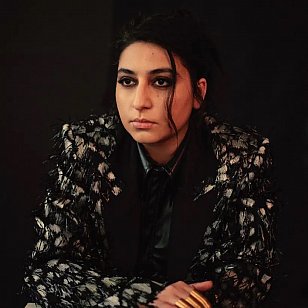
As far as we can recall, it had never happened before until late last year: an artist whose two consecutive album ended up in our best of the year list.
Arooj Aftab's Love in Exile was in the best of Elsewhere 2023 list and her previous one Vulture Prince was in the same list in 2021.
And we had them both as a Recommended Record (albums to have on vinyl).
So needless to say she has counted among our favourite artists and we were delighted to learn she would be playing in this country very soon.
Interestingly too she is playing the bid outdoor Womad festival but also at the Arts Festival in an indoor concert setting.
And then we were even more delighted to interview her, and what a charming, funny, intellectual and spiritual woman she was.
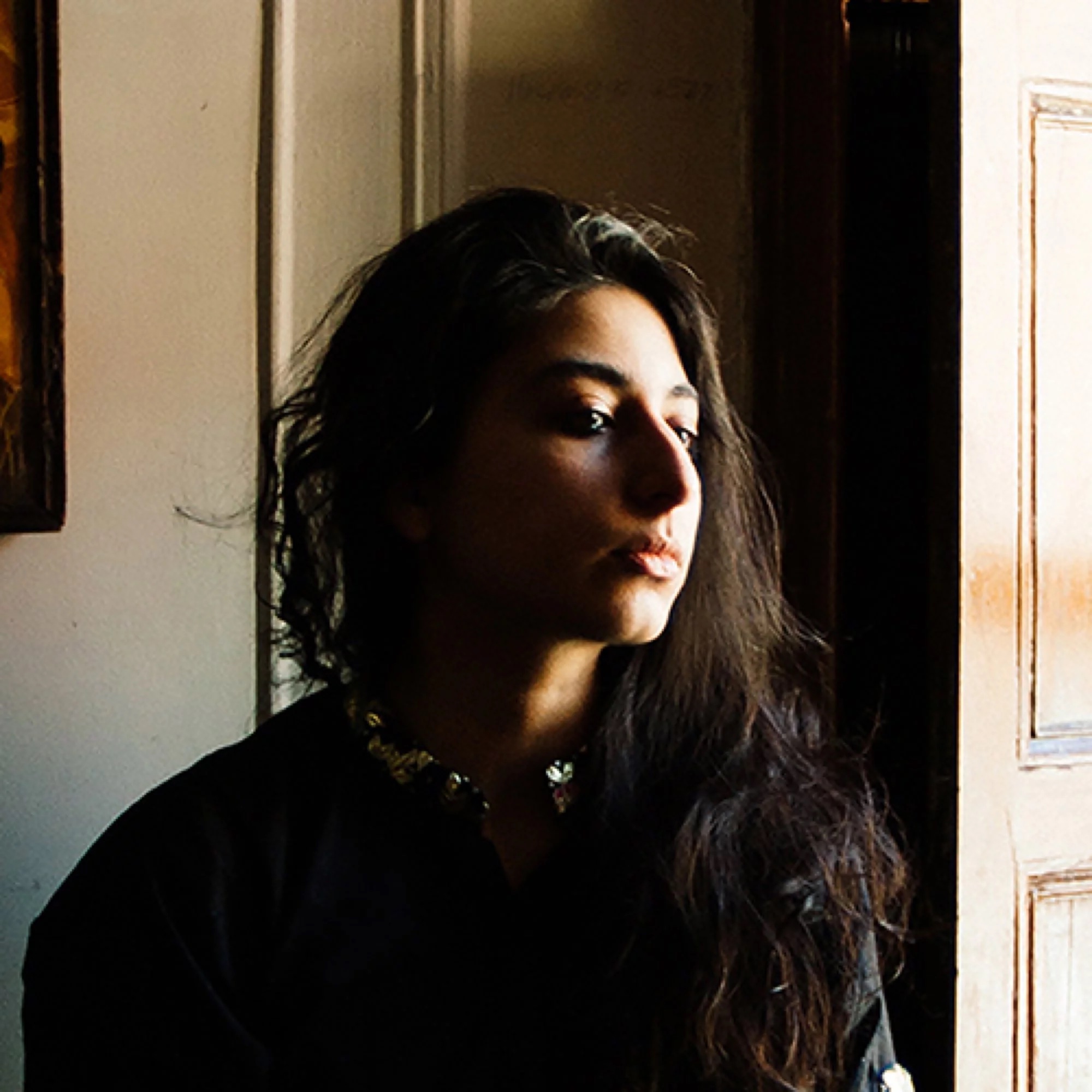 She is embarrassed to come on the Zoom call because she's just slicked back her hair with oil, and laughs when I note that I'd just stepped out of the shower and my hair is plastered down also.
She is embarrassed to come on the Zoom call because she's just slicked back her hair with oil, and laughs when I note that I'd just stepped out of the shower and my hair is plastered down also.
After we laugh about that – nice ice-breaker – she tells us she has a new record coming out in the spring and is just finishing the masters and mixes. There are photoshoots and packaging things to go through but the promise of a third so soon after her Vulture Prince breakthrough is something to look forward to.
Meantime, let's allow her to have her say . . .
Arooj Aftab's life has been one of movement, from country to country and through many musical styles which reached a recent peak with one of her sublime, spiritually calming songs Mohabbat picking up Best Global Music Performance at the 2022 Grammys.
The song came from her hypnotic Vulture Prince album which is mostly in Urdu but included a subtle reggae groove on the English-language Last Night based on a poem by the Persian Sufi poet Rumi. The album was on numerous “best of 2021” count-backs and won her the prestigious Pride of Performance award in Pakistan.
At 38, New York-based Arooj Aftab has come a long way from playing Oasis' Wonderwall for friends at high school in Lahore to having Mohabbat on Barack Obama's 2021 summer playlist.
Vulture Prince is a rare album in that, despite being born of personal grief and loss, it conveys a sense of rest and calm.
“The impression it gives you is the first layer is meditative, calming and ambient, “ she says of Vulture Prince from her home in Brooklyn. “Then other layers open up. It has depth in it that I designed, but it has that meditative quality for sure.”
People find comfort in the album in much the same way as the holy minimalism of Arvo Part's austere Tabula Rasa found an audience seeking solace in the 80s, many of them Aids patients: “It sounds like the motion of angels' wings,” said one.
Or the 1994 Jan Garbarek/Hilliard Ensemble's Officium, a pairing of soprano saxophone and medieval chants recorded in an Austrian monastery which sold more than 250,000 physical copies and now has millions of streams.
Yet for all Vulture Prince's quiet intimacy best suited to a concert chamber, Aftab – who plays the Taranaki Womad with guitarist Gyan Riley and bassist Petros Klampanis – says there's something special about outdoor festivals like Coachella and Glastonbury where “the music goes into the sky, there's more flight to it. It soars”.
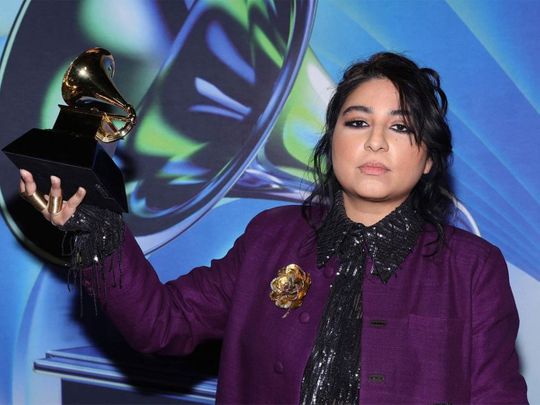 For a singular artist Aftab's musical interests were very much those of her generation.
For a singular artist Aftab's musical interests were very much those of her generation.
Personable, modest and an easy conversationalist, Aftab was born in Riyadh, Saudi Arabia to Pakistani parents, the family returned to Lahore in the mid 90s where she began her first serious engagement with music playing Western pop songs on her guitar.
“We had MTV on, listening to Michael Jackson, Mariah, Janet Jackson . . . My mom listened to classical music and my parents and their friends would listen to semi-classical South Asian music.
“We were just really lovers of music and they kind of instilled that in us, just a lot of openness to hear what you like and build your taste and talk about it.
“The influence from them was just an insane love of music really.”
There were Urdu popular and classical songs in local coffee shops (“it is just ingrained in the culture of Pakistan”) and she picked up guitar.
“Everyone in my high school was very annoying because I was making all these long experimental guitar pieces and they were saying, 'Why aren't you singing songs, why aren't you singing Wonderwall?
“Because I was bringing the guitar to school every day they'd say, 'play With or Without You, play Seven Nation Army or whatever those songs of our teens were.
“And I learned how to sing them quite reluctantly. It was 'due to popular demand',” she laughs.
Alongside being an early adopter of the internet – her version of Leonard Cohen's Hallelujah went viral – and that melange of musical influences, she became entranced by jazz.
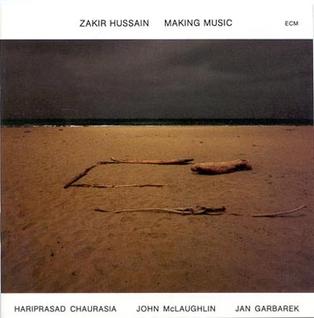 A 1987 Indo-jazz album Making Music by tabla player Zakir Hussain and flute player Hariprasad Chaurasia with British guitarist John McLaughlin and Norwegian saxophonist Jan Garbarek “was mind-blowing and that started to pull my ears towards jazz”.
A 1987 Indo-jazz album Making Music by tabla player Zakir Hussain and flute player Hariprasad Chaurasia with British guitarist John McLaughlin and Norwegian saxophonist Jan Garbarek “was mind-blowing and that started to pull my ears towards jazz”.
“There'd been the Spice Girls and Backstreet Boys, but then Zakir Hussain which was so consequential it was like, 'Bye' to all that pop music. It was so far away from what I'd known.
“Then I found Billie Holiday, Ella [Fitzgerald] and Nina [Simone]. All the ladies just came out.
“I couldn't unhear it, it was just so shockingly amazing and moving. It was deep and political and there was so much integrity in that music that my mind was blown so I gravitated towards jazz.”
Finding her own path, something unique beyond pop and the jazz she was starting to discover, was problematic.
“In my teens I really really felt that confusion where you think, 'what is music?' and 'how do you do that?'. You do what, start a garage band and hope it works out?
“There really isn't a system you can enter and so, much as I knew I loved music, it took me a while to figure out how to do it. I didn't have a plan except I should study music at a dedicated institution and get a bachelor's degree and then we'll see.”
She attended the prestigious Berklee College of Music in Boston where she studied jazz voice, jazz arrangement, theory and also “engineering, production, a lot of studio and technical stuff”, the latter unwittingly setting her up for her next phase.
After graduation she moved to New York where she fell in with post-minimalists and experimental artists who “created space, they didn't create drama. They are super-interested in things and they want to know what it is that you do”.
She speaks enthusiastically about the “classical post-minimalists” she loves: Morton Feldman, Terry Riley, Julius Eastman and John Cage.
“The use of space in the music became useful to me because you move to New York and it's so loud in your head and it's expensive because there was the recession in 2008-09. It was fucking crazy!”
Although she says she hadn't found her sound, a community of musicians or sharpened how she should communicate ideas when she wasn't an instrumentalist, she fell into “a non-traditional style of music communication and a little pocket of dub reggae and the minimalists. There was space for my my mind, and it was nourishing”.
All that came out in pieces for soundtracks and on her album Bird Under Water (2014) – with its blend of her voice, Indian instruments and jazz players – and her vocals-with-synths Siren Islands (2018), two electronica-experimental albums prior to Vulture Prince.
Good though they were they didn't hint at what was to come with Vulture Prince.
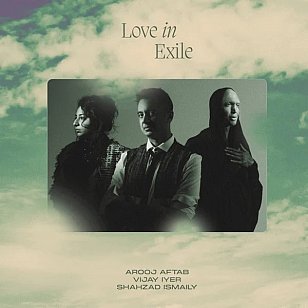 The key to that album is in fact the one which arrived afterwards, Love in Exile with jazz pianist Vijay Iyer and bassist/synth player Shahzad Ismaily.
The key to that album is in fact the one which arrived afterwards, Love in Exile with jazz pianist Vijay Iyer and bassist/synth player Shahzad Ismaily.
It was recorded before her breakthrough and where she wanted the voice to simply be heard as another instrument.
“I didn't want to be the singer in the middle telling people stuff, but vocalists are usually met with the fact the voice is not an instrument in a very clear sense of the word. It's a different thing.
“It has been done, like scatting, but it's difficult so we revert back into whatever it we were doing.
“But that was how I approached Love in Exile. It was important to say I was an instrument to the guys so they are thinking that when they hear me sing. We scratched the surface.”
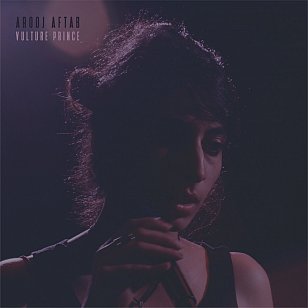 It certainly opened to possibilities for Vulture Prince which was not the album she originally intended, but after the deaths of a friend and her brother she was drawn deeper into herself and spirituality.
It certainly opened to possibilities for Vulture Prince which was not the album she originally intended, but after the deaths of a friend and her brother she was drawn deeper into herself and spirituality.
Like Tabula Rasa, Officium and Henryk Górecki's 1976 Symphony of Sorrowful Songs – which became popular when the London Sinfonietta recorded it with soprano Dawn Upshaw in 1991 -- Vulture Prince is a place where people can find solace.
Since its release it has become even more significant?
“I think so. I was in Saudi Arabia in the Gulf War as a child and here we are again. And the whole India-Pakistan-Kashmir thing goes on.
“But now because we're plugged into the internet and see everything, it can be unbelievable overwhelming. I sometimes think my head will explode.
“I used to think it didn't matter and we [musicians] were just making our little things. But I think it's helpful to rest and restore and calm yourself to do the work that needs to be done. We can't just go insane.
“So yes, in some small way it is significant.”
.
Arooj Aftab and her group play the Michael Fowler Centre, Wellington, March 14 and the Taranaki Womad, New Plymouth, March 15 – 17, 2024.
.
Albums by Arooj Aftab are available digitally, Vulture Prince is on vinyl in an expanded edition which includes a new track with sitar player Anoushka Shankar.
“I met Anoushka in 2005 when I came to Berklee and she was playing at the performance centre. A friend of mine knew her bass player so we went backstage and we met her and she invited us to dinner.
“She's just a few years older than me and we've been in touch for that long and followed each other's careers. Of course hers is light years ahead of mine although I feel I've caught up in the last few years.
“We've always wanted to collaborate but there's never been quite the right time or place because she was in California then London with her kids . . . and she was quarantined during Covid so I said, 'Anoushka, just do this little piece right now'. She had nothing else to do!”


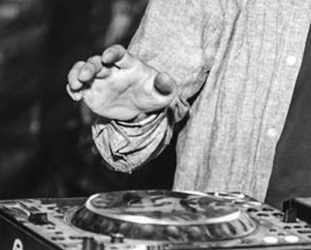
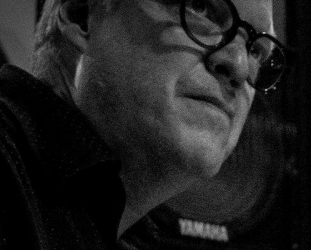
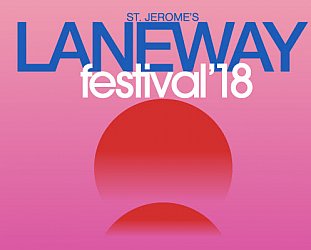
post a comment